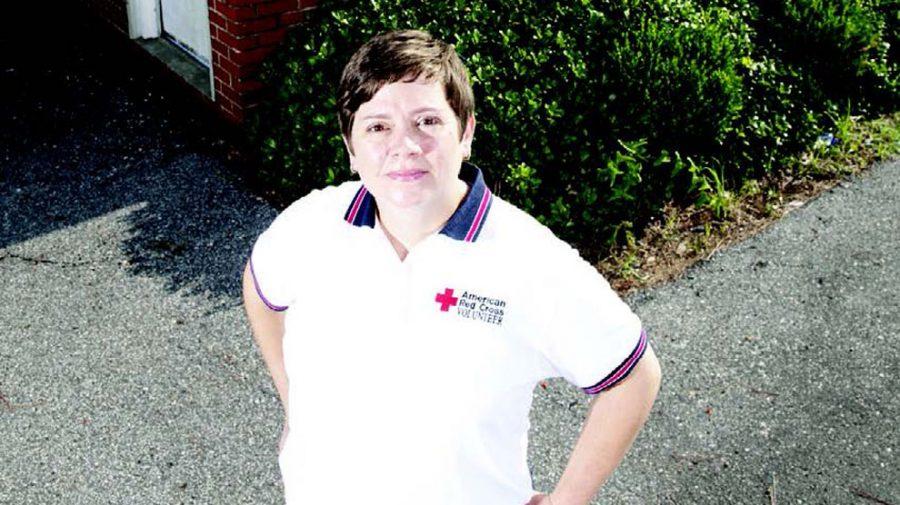The trying times that have gripped Tuscaloosa in the past few months have unmasked the true identity of many in our community. On April 27, most did not know the strength and ability of many unnamed heroes, which tragedy would force out into the forefront of action that evening.
One of these hidden heroes is J. Suzanne Horsley.
Horsley is the assistant professor of advertising and public relations in the College of Communication and Information Sciences. She is a prolific writer whose work has been featured in numerous books and texts. Horsley also serves as a national public affairs volunteer for the Red Cross.
“I started volunteering in 2005 while I was going to graduate school at UNC Chapel Hill,” Horsley said. “I started working with the chapter before Hurricane Katrina, so I ended up doing some work with the local chapter related to the hurricane. That was my first taste of disaster public affairs. Since then, I have received training that allows me to deploy to disasters around the country.”
Horsley has been deployed to some of the worst hit disaster zones of the past decade.
“I have been to the Fargo, North Dakota floods, a fatal campground flash flood in Arkansas, and a tropical storm in New Orleans,” she said.
Horsley has not always been in the center of disaster zones, however. She said she was on a teaching path after graduating from Mary Washington College in Fredericksburg, Va. when she had a life changing experience.
“I was an English major in undergrad and didn’t know what PR was until I landed an internship my senior year in a hospital’s PR and Marketing department,” she said. “Everyone was telling me that the only job I could get with an English degree was teaching K-12, and I wasn’t interested in that. This internship showed me I could put my writing skills and creativity to use in a much different way, and I fell in love with the idea of PR.”
Horsley followed her newfound love of public relations to the private sector, where she worked for 10 years in Virginia. But something about the promise of education drew her into academia, she said. After three years of teaching at the University of Utah, Horsley just entered her third at the Capstone.
The self proclaimed “disaster junkie” was one of the most prepared when a massive EF4 tornado ripped through six miles of Tuscaloosa in April. Horsley immediately sprung to action as she was trained to do.
“I am actually the only nationally trained disaster public affairs spokesperson in the West Alabama Chapter, with our next closest person being in Hoover,” she said. “Because this disaster was right in my own backyard, I was responsible for working with all media who covered the event and providing information to the public about the disaster relief shelter and other assistance that the Red Cross was providing.”
In the aftermath of any disaster, a communication gap can often lead to unnecessary breakdowns in organization and in the recovery process as a whole. Horsley was charged with making sure this did not happen in Tuscaloosa.
“This is the largest disaster I have ever been involved in, and I hope I never see a disaster greater than this one with so much loss of life and property,” she said. “I was very impressed with the disaster response in Tuscaloosa. Considering how widespread the damage was and how much of our city’s emergency infrastructure was destroyed, I believed the city, disaster relief organizations, faith-based groups and University community members came together and did an amazing job of saving lives and helping our community recover.”
Horsley said she believes her various experiences with the Red Cross has made her a better teacher and enriched the learning experience of her students.
“First of all, the fantastic training and experience that I get with the Red Cross keeps me current in public relations, which is a great benefit when you are teaching in a profession that is constantly changing,” she said. “Second, I incorporate my experiences and accessibility to the world of disaster management into my research, which I hope will help other communities and organizations be more prepared for the next disaster. Finally, I am able to use my skills and training to help my community and to involve students in valuable service learning experiences.”
This ability to draw upon her incredible life experiences in the classroom has won Horsley national acclaim. She was just recently awarded with the SuPRStar Award for Excellence in Community Service from the Association for Education in Journalism and Mass Communication. But when asked about this honor, Horsley characteristically relates it back to others.
“For me, this is a special award because it was awarded by my peers who teach public relations, just like me,” she said. “I was also honored that the chair of my department, Dr. Joe Phelps, nominated me for the award. The support of my colleagues is priceless, and I am fortunate to teach with such a wonderful group of faculty and staff.”
But where Horsley is unwilling to talk up her accomplishments, her boss, Joe Phelps, the chair of the department of advertising and public relations, certainly will.
“Dr. Horsley had been called into service by the Red Cross to help in disaster situations on a number of occasions before we experienced this recent disaster in Tuscaloosa,” Phelps said. “In the past, she was called to leave home to help others. This time, she was called to stay home and to help us. The fact that this national organization looks to one of our faculty members to provide the needed expertise reflects well on the quality of our faculty. Of course I am biased, but there simply is no better Advertising and Public Relations faculty in the U.S.”









